Click on a picture to enlarge it
| Snakes in Movies Group Pages |
All Movie Snakes Must Die! |
| All Movie Snakes Want to Kill You! |
| Dancing With Snakes |
| Giant Monster Snakes |
| Pet Snakes |
| Shooting Snakes |
| Snake Bites |
| Snake Charmers |
| Snake Face |
| Snake Fights |
| Snake People |
| Snake Pits |
| SnakeSexploitation |
| Snakes & Skulls |
| Snakes Run Amok |
| Snakes Used as Weapons |
| Snakes Used for Comedy |
| Snakes Used for Food or Medicine |
| Snakes Used Realistically |
| Throwing and Whipping Snakes |
| Kinds of Snakes |
| Rattlesnakes |
| Cobras |
| Black Mambas |
| Boas, Pythons, and Anacondas |
| Kingsnakes and Tricolor Snakes |
| Unusual Species
|
| Settings |
| Snake in the House! |
| Snakes in Beds |
| Snakes in
Jungles and Swamps |
| Snakes In Trees |
| Genres & Locations |
| Snakes In Westerns |
| Snakes in Asian Movies |
| Herps in Australian Movies |
| Herps in James Bond Movies |
| Herps in Silent Movies |
| Herps in Spielberg Movies |
| Snakes in Movies | ||
| The Ten Commandments (1956) | ||
| Spoiler Alert ! Some of these pictures and descriptions may give away plot details that you might not want to know before watching the film. |
||
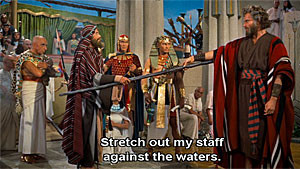 |
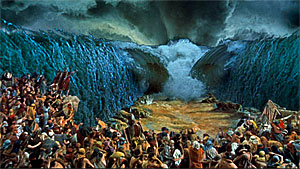 |
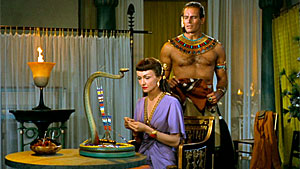 |
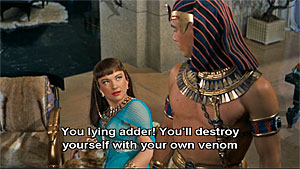 |
 |
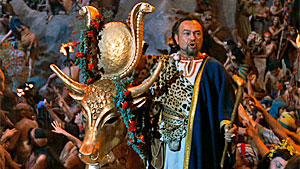 |
| This is the story of Moses, a man with a big staff who knows how to use it. He tells his follower Joshua that it is not by the sword that God will deliver his people but by the staff of a shepherd. He uses his shepherd's staff to beat his enemies, to turn a river to blood to antagonize the Pharaoh, to part the sea to lead his people on a 40-year hike in the desert, and he can turn his staff into a snake to prove that his God is powerful. This massive biblical epic directed by Cecil B. Demille was a huge hit and is still one of the highest-grossing movies when adjusted for inflation. It also won an Oscar for its special effects, which are still kind of impressive. But all this is despite the fact that it is three and a half hours of watching Charlton Heston, Yul Brenner, Anne Baxter, Edward G. Robinson, and Vincent Price compete to see who can chew up the most scenery. I give Anne Baxter the win, but it's a close contest. Despite the overacting, the overbearing soundtrack with too many fanfares, and the ridiculous love triangle, it's still a compelling story that is surprisingly entertaining to watch sixty years later. There's also a good snake scene, a few other snake references, and the set designers had fun with cobra motifs as they always seem to do in Egyptian-themed movies. There are cobra headdresses, a frame for bead-making in the form of a snake, cobra support columns, and even the golden calf idol that Moses' people make in the silliest orgy scene ever filmed is decorated with cobras. |
||
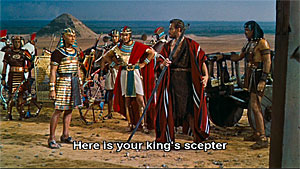 |
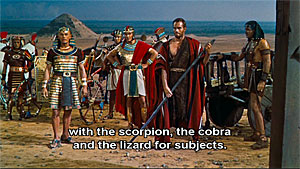 |
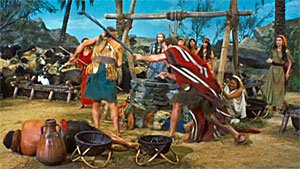 |
| Moses was an Egyptian prince until it was discovered that he's the son of Hebrew slaves. When the Pharaoh finds out that Moses is Hebrew, he orders his son Rameses (Yul Brynner) to get rid of him. Rameses takes Moses to the desert and gives him only one day's rations, expecting him to die. He gives Moses a large wooden staff he calls a "king's scepter" to rule the scorpions, cobras, and lizards in his desert kingdom. But Moses survives, and uses the staff to fight enemies and to herd sheep. He gets married, has a son, and then is directed by God in the form of a burning bush to go to Egypt and demand that the Pharaoh free the Hebrew slaves. After years of trying to convince Rameses, Moses finally forces him to free the slaves, then he leads them out of Egypt and presents them with laws to live by, hand-carved on stone tablets by God himself. |
||
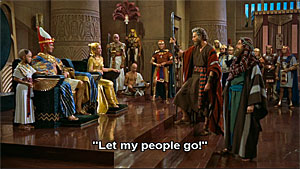 |
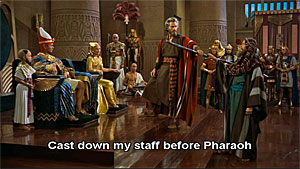 |
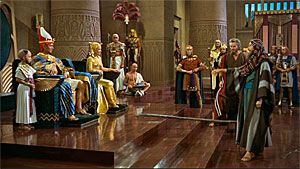 |
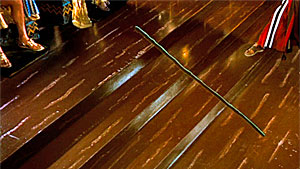 |
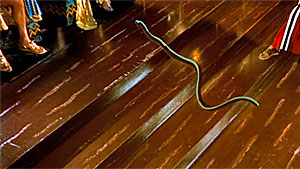 |
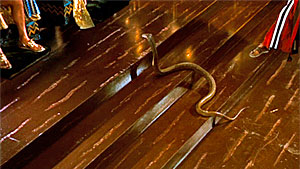 |
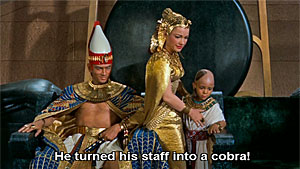 |
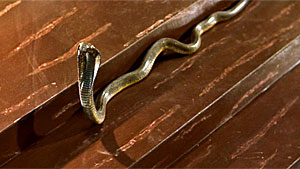 |
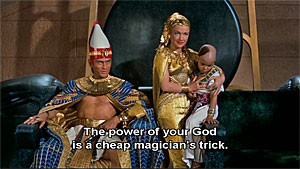 |
| After Rameses becomes Pharaoh, Moses travels to Egypt. He appears before Rameses and is asked what he brings in tribute. He tells them he brings the word of his God. He demands that Rameses frees the Hebrews and is laughed at. To prove that his God is powerful, Moses tells Aaron to set down the shepherd's staff that was given to him by Rameses and we see the staff turn into a cobra. |
||
 |
 |
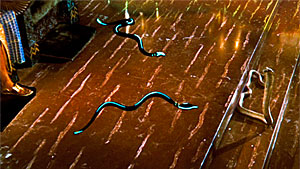 |
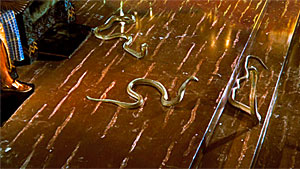 |
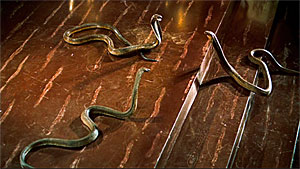 |
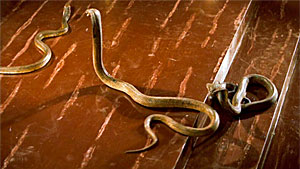 |
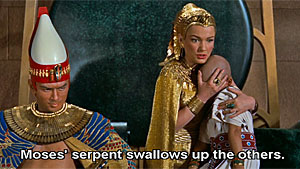 |
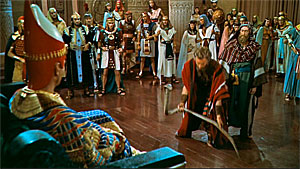 |
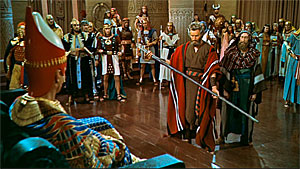 |
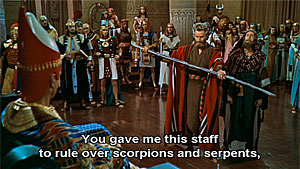 |
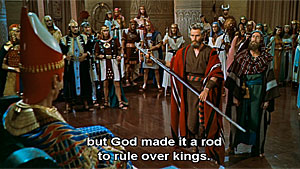 |
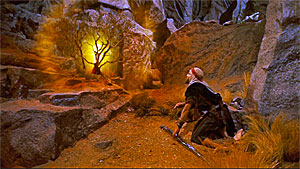 |
| Rameses calls it a cheap magician's trick and directs his men to lay down two staffs which turn into two more cobras. As we see the snakes interacting with each other, the camera cuts away and we see the faces of Rameses, his son, and his wife and ex-lover of Moses, Nephertiri (Anne Baxter) who exclaims that Moses' serpent swallowed up the other snakes. (I assume the special effects were not good enough to let us see this ourselves.) This is the first of many examples that Moses shows Rameses of how powerful his God is, but Rameses does not give in until his own son is killed. Even then he changes his mind and chases after Moses and his people until Moses parts the sea and they all escape. The snake scene doesn't make a lot of sense to me. I understand how Moses' staff can turn into snakes - it's God magic - but this is the first and only time we see that Rameses has any kind of magic powers. Are they from his gods? If he can also turn staffs into snakes, why doesn't he use other magic against Moses? The staffs that turn into snakes are first crudely animated, then the animation is morphed into real cobras. These cobras still appear a bit strange, as if they are painted or even animated in a different way. |
||